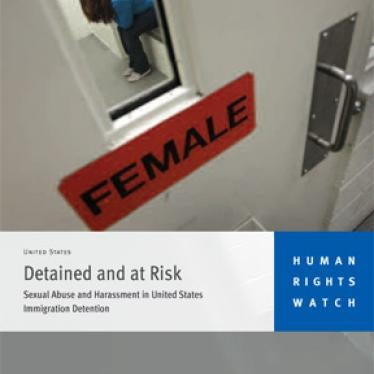(New York) - Proposed Justice Department standards to reduce rape in prison are unduly weak and should be significantly improved to protect victims and ensure accountability, Human Rights Watch said today in comments submitted to the department. The Justice Department released its proposed standards under the Prison Rape Elimination Act (PREA) on February 3, 2011, and established a sixty day comment period, ending April 4.
"Congress knew that eliminating prison rape might require changing the way prisons and jails are run, perhaps even spending more," said Jamie Fellner, senior advisor to the US Program at Human Rights Watch and a former commissioner on the National Prison Rape Elimination Commission. "Yet the Justice Department's proposed standards reflect greater concern with appeasing correctional agencies than with protecting adults and youth from sexual abuse."
Congress unanimously passed PREA in 2003. The Act established the National Prison Rape Elimination Commission to undertake a comprehensive study on the causes and consequences of prison rape and to propose national standards to prevent, detect, and punish it. The commission issued its standards on June 23, 2009.
Although the Justice Department has adopted many of the standards the commission proposed, and even strengthened some, a number of the proposed standards constitute an unjustified step backward, Human Rights Watch said. In 63 pages of comments submitted on April 4 to the Justice Department, Human Rights Watch raises numerous concerns about weakened standards and about the department's cost-benefit analysis of the standards. Among the concerns Human Rights Watch raised are:
Failure to cover immigration facilities. The Justice Department has stated that its proposed standards would not apply to ICE facilities notwithstanding PREA's requirement that the facilities covered by the law include "any confinement facility of a Federal, State, or local government, whether administered by such government or by a private organization on behalf of such government." Although available data are limited, sexual abuse in immigration facilities is widespread and the drafters of the law clearly intended to include immigration facilities. Human Rights Watch wrote separately to President Obama expressing the concerns about the exclusion of immigration facilities.
Failure to prohibit cross-gender pat down searches of inmates. Sexual touching can occur under cover of cross-gender pat down searches. Such touching is not only abusive in its own right, but can be a precursor to rape. Most prison agencies prohibit male staff from searching female inmates, but the proposed rules would permit it. Such searches should be prohibited, Human Rights Watch said. Human Rights Watch recognizes that for many agencies, prohibiting female staff from searching male inmates would be extremely costly, given that agencies often employ many women to work in male facilities. The solution is not, as the Justice Department suggests, to permit all such cross-gender searches, but instead to allow agencies to phase in the female-on-male prohibition over a couple of years.
Failure to guarantee necessary staffing. A proposed standard would require agencies to make and annually review staffing plans to keep inmates safe from sexual abuse. The standard does not require prisons to carry out those plans, however.
Failure to minimize obstacles for sexually abused inmates to access judicial relief. The Justice Department proposes an absurdly short time period - 20 days - for an adult inmate, who might well be traumatized by a sexual attack, to report sexual abuse for purposes of triggering the administrative remedy process or forfeit their chance to get judicial relief. The department points out that the Bureau of Prisons uses that time period, but the bureau's policy sacrifices the legitimate interests of sexual abuse victims to get their day in court. Similarly short time periods are imposed on juvenile victims, even though their developmental differences and vulnerabilities are likely to require an even longer period for them to report than for adults.
Failure to require independent periodic audits. The department has not adopted the requirement of regular audits of compliance with PREA standards by qualified auditors wholly independent of the agency being audited. Such audits are crucial to the law's success, even if uncomfortable for agencies unaccustomed to mandatory close scrutiny of their operations.
Failure to undertake a reasonable cost-benefit analysis. Under federal law, since putting PREA into effect would have a large administrative impact, the Justice Department was required to undertake a cost-benefit analysis of the proposed standard. In calculating the cost of prison rape, however, the department made unreasonable and unsubstantiated assumptions that lowered those costs. For example, the Justice department calculated the cost of rape by force for inmates in adult facilities to be between $200,000 and $300,000 per victim, but the cost of rape by coercion or pressure not involving physical force to be only one-fifth as much, i.e. between $40,000 and $60,000.
There is nothing in the academic literature, litigation, or clinical experience to support the view that, on average, prison rape by coercion is only one-fifth as "costly" as rape by physical force. Regardless of whether force is used or threatened, nonconsensual inmate-on-inmate or staff-on-inmate sex can cause psychological trauma and lead to depression, substance abuse, and post-traumatic stress disorder, among other psychological problems, and it can cause HIV/AIDS, other sexually transmitted or infectious diseases, and pregnancy.
Failure to understand the significance of sexual touching behind bars. The department establishes a cost of $375 for victims of unwanted sexual touching, based on cost estimates from outside prison settings. But what may be relatively harmless, albeit offensive, behavior outside prisons can be deeply threatening and traumatizing behind bars, where the victim cannot escape the predator. There is no basis given for setting the "cost" at a minimal amount.







